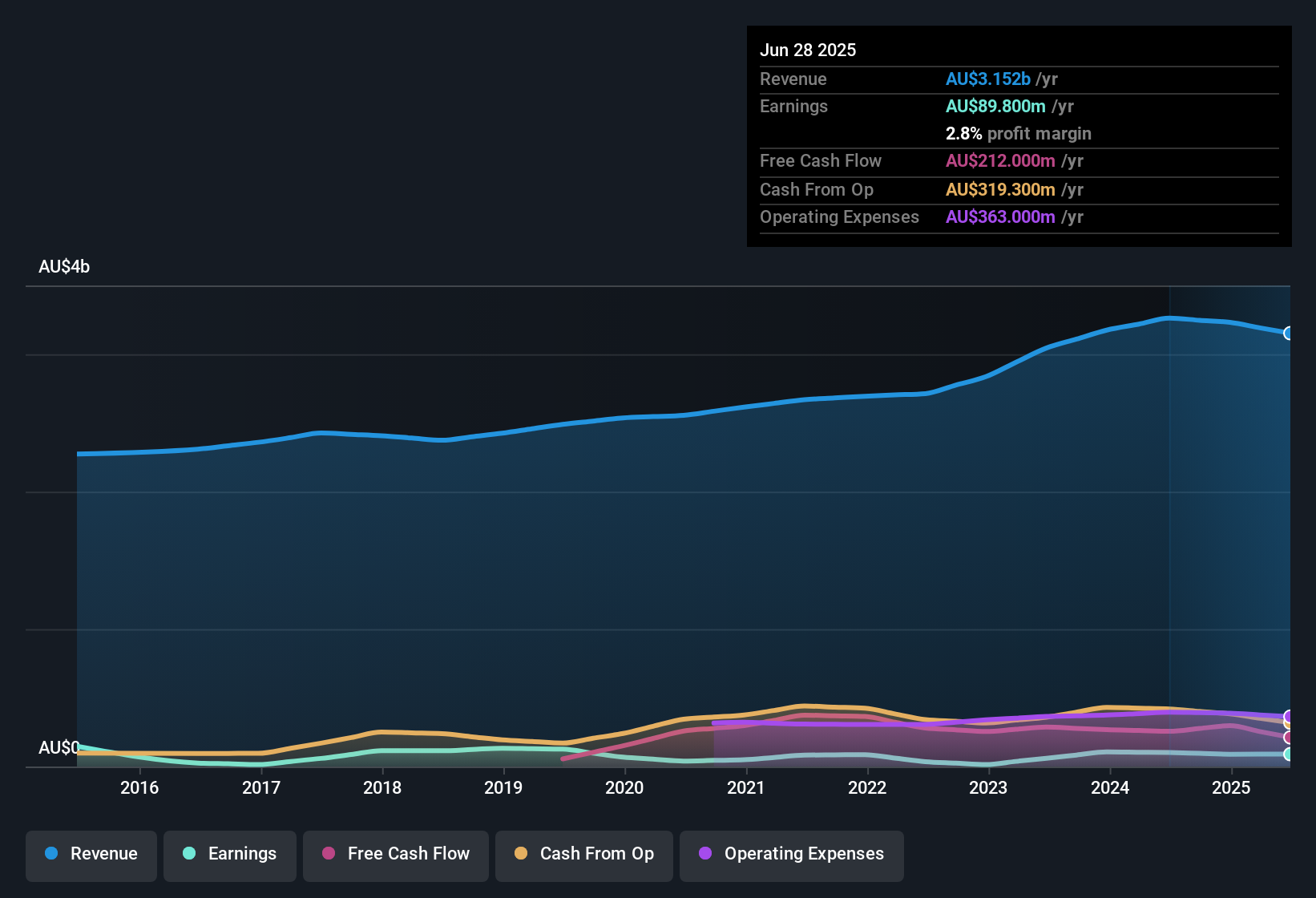There May Be Reason For Hope In Inghams Group's (ASX:ING) Disappointing Earnings
Inghams Group Limited's (ASX:ING) earnings announcement last week didn't impress shareholders. While the headline numbers were soft, we believe that investors might be missing some encouraging factors.

Zooming In On Inghams Group's Earnings
Many investors haven't heard of the accrual ratio from cashflow, but it is actually a useful measure of how well a company's profit is backed up by free cash flow (FCF) during a given period. The accrual ratio subtracts the FCF from the profit for a given period, and divides the result by the average operating assets of the company over that time. This ratio tells us how much of a company's profit is not backed by free cashflow.
Therefore, it's actually considered a good thing when a company has a negative accrual ratio, but a bad thing if its accrual ratio is positive. While having an accrual ratio above zero is of little concern, we do think it's worth noting when a company has a relatively high accrual ratio. Notably, there is some academic evidence that suggests that a high accrual ratio is a bad sign for near-term profits, generally speaking.
Over the twelve months to June 2025, Inghams Group recorded an accrual ratio of -0.16. Therefore, its statutory earnings were very significantly less than its free cashflow. Indeed, in the last twelve months it reported free cash flow of AU$212m, well over the AU$89.8m it reported in profit. Inghams Group's free cash flow actually declined over the last year, which is disappointing, like non-biodegradable balloons.
That might leave you wondering what analysts are forecasting in terms of future profitability. Luckily, you can click here to see an interactive graph depicting future profitability, based on their estimates.
Our Take On Inghams Group's Profit Performance
Happily for shareholders, Inghams Group produced plenty of free cash flow to back up its statutory profit numbers. Based on this observation, we consider it possible that Inghams Group's statutory profit actually understates its earnings potential! And on top of that, its earnings per share have grown at an extremely impressive rate over the last three years. At the end of the day, it's essential to consider more than just the factors above, if you want to understand the company properly. So while earnings quality is important, it's equally important to consider the risks facing Inghams Group at this point in time. Case in point: We've spotted 2 warning signs for Inghams Group you should be mindful of and 1 of these is potentially serious.
Today we've zoomed in on a single data point to better understand the nature of Inghams Group's profit. But there are plenty of other ways to inform your opinion of a company. For example, many people consider a high return on equity as an indication of favorable business economics, while others like to 'follow the money' and search out stocks that insiders are buying. So you may wish to see this free collection of companies boasting high return on equity, or this list of stocks with high insider ownership.
New: AI Stock Screener & Alerts
Our new AI Stock Screener scans the market every day to uncover opportunities.
• Dividend Powerhouses (3%+ Yield)
• Undervalued Small Caps with Insider Buying
• High growth Tech and AI Companies
Or build your own from over 50 metrics.
Have feedback on this article? Concerned about the content? Get in touch with us directly. Alternatively, email editorial-team (at) simplywallst.com.
This article by Simply Wall St is general in nature. We provide commentary based on historical data and analyst forecasts only using an unbiased methodology and our articles are not intended to be financial advice. It does not constitute a recommendation to buy or sell any stock, and does not take account of your objectives, or your financial situation. We aim to bring you long-term focused analysis driven by fundamental data. Note that our analysis may not factor in the latest price-sensitive company announcements or qualitative material. Simply Wall St has no position in any stocks mentioned.
About ASX:ING
Inghams Group
Engages in the production and sale of chicken and turkey products under the Ingham’s brand primarily in Australia and New Zealand.
Undervalued average dividend payer.
Similar Companies
Market Insights
Community Narratives




